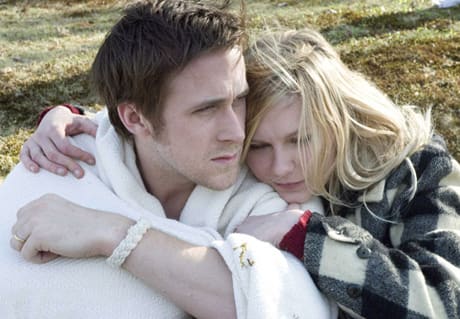Truth informs fiction, and every truth contains an element of fiction. Director Andrew Jarecki follows his award-winning documentary, Capturing the Friedmans, with this fictionalized extrapolation of events and motivations surrounding a famous unsolved missing persons case. Ryan Gosling brings a great deal of restraint to his portrayal of David Marks, the at first only mildly socially dysfunctional son of NYC real estate tycoon Seymour Marks. The narrative spine of the film is built upon the testimony David's giving as an older man while on trial in Texas for the murder of drifter Morris Black. Intended as a humanizing sympathy plea to the jury, David tells his life story and version of events. Jarecki and screenwriters Marcus Hinchey and Marc Smerling use this perspective as one of many in attempts to piece together what really happened to David's wife, Katie, who went missing years earlier amid suspicious circumstances. Starting at the beginning of their relationship, it's the sad love story of David and Katie that most strongly animates All Good Things, the title taken from the health food store the couple open in the country after meeting by chance in the NYC. Kirsten Dunst plays Katie, given, and delivering, the strongest role of her career. She and Gosling have excellent chemistry, nurturing a tender and accepting love put under strain by the dismissive and condescending authority of David's manipulative, soul-crushing father (an especially unsettling Frank Langella). David is by no means presented as normal, but the filmmakers' narrative intent suggests he and Katie may have been happy were he not manipulated into joining the family business he's so vehemently disinterested in by questions of the lifestyle his wife might prefer. That's one of David's biggest problems: he doesn't ask and he doesn't tell. He silently encourages people to project onto him what they hope he is and want him to be so that he doesn't have to act so hard to be what they want. Over two acts, a disturbing yet sympathetic portrait of a man twisted by the yoke of expectation emerges and as his dissatisfaction turns violent and increasingly antisocial, a mournful love story morphs into a gripping suspense thriller. If this were fiction, the story would naturally end once Katie disappears, but this is cinema as fact-finding mission and life contains some zany plot twists. The massive tonal shift for the final act is acknowledged in the director/writers' commentary and it's hard to think of how the transition could have been made smoother. It doesn't hurt the film, but it certainly makes it a harder sell and the incidental humour feels strange after the preceding emotional roller coaster, but that's life. On the subject of humour, look out for strong non-comedic roles by Nick Offerman (Parks and Recreation) and Kristin Wiig (Walk Hard, Bridesmaids). The presentation of evidence is damning enough, so it's a shame Jarecki resorts to a pair of shots at the end that essentially rub the audience's nose in an interpretation that's already been made clear. In a thorough presentation of the extensive research, Jarecki almost exonerates himself of the undue heavy-handedness. "Truth in Fiction" explains how they spent years going through public records, tracking down and interviewing everyone involved in a series of events reaching back 30 years. Jarecki and his team are confident their research has led to a more complete picture of what may have happened than anyone has had previously and they painstakingly detail their process of discovery and dedication to a balanced perspective that's almost displayed in the final product. "Back in Time" is basically an info/confirmation reel of many of the interviews with friends, family, neighbours, acquaintances and law enforcement officials conducted to shape the script. Once you've seen the look on the former investigating detective's face as he refuses to answer how and why he was taken off the case, it's easier to forgive the extra force applied to the director's position. Also included: time-lapse age make-up with Gosling, a full version of the Jarecki interview used in the features, deleted scenes and a commentary track that does a lot of rehashing of info found elsewhere, but also contains more insight into an already fascinating case that explores the moral grey areas present in all humanity and the kinds of experiences and pressures that can lead a person to dark decisions.
(Alliance)All Good Things [Blu-Ray]
Andrew Jarecki

BY Scott A. GrayPublished May 25, 2011



